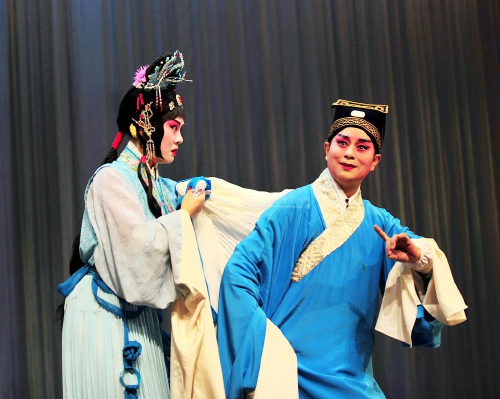 |
|
LOCAL ART: Two performers act in a scene from a traditional Hunan Opera play (FILE) |
Central China's Hunan Province has a long history of outstanding opera culture. Today, Hunan's opera traditions have become part of its intangible cultural heritage, and local operas continue to develop and evolve.
A rich repertoire
There are 19 major kinds of local operas in Hunan. These operas not only reflect the wide variety of cultural traditions in the province, but also have connections to Buddhism, Taoism, Confucianism and local religions.
Hunan's long-form operas, such as Hunan Opera, Hunan Kunqu Opera and Qiju Opera, have been influenced by many of China's other schools of opera. However, they have been restructured and rebuilt based on local culture.
Hunan Opera is popular in east Hunan and the neighboring Jiangxi and Guangdong provinces. It originated during the Ming Dynasty (1368-1644). Originally, the plays would be love stories or based on morality tales. However, in the 1910s and during World War II, many new plays were created to call for democratic revolution and to rise up against Japanese aggression. In recent decades, the local government has tried to revive this tradition by organizing veteran performers in collecting and preserving the art form's traditional works. In May 2006, Hunan Opera was included in China's first batch of state-level intangible cultural heritage. Now Hunan Opera has around 700 full-length plays, and a further 500 incomplete ones.
Hunan Kunqu Opera is a particularly interesting branch of Kunqu Opera. After Kunqu Opera was brought to Hunan from the late 16th century to the early 17th century, performers in the province combined local culture and dialect to form a unique addition to Chinese opera.
Qiju Opera is another form of opera that Hunan people are proud of. This art form, which originated in southwest Hunan's Qiyang, has a history 400 years longer than that of Peking Opera. Since its inception, Qiju Opera has spread to Guangxi Zhuang Autonomous region, Jiangxi Province, Fujian Province, Guizhou Province and even northwest China's Xinjiang Uygur Autonomous Region, and influenced local operas and plays in these areas.
Huagu Opera is a short-form opera that originated in popular folk tunes in Hunan in the 18th century, though it gradually gained popularity in other provinces such as Hubei, Jiangxi, Anhui, Henan and Shaanxi. Zou Shiyi, a former researcher with the Hunan Institute of Art, suggested that farmers originally created the opera as a form of recreation for the working day. He explained that, Huagu Opera, whose name translates directly as "flower drum opera," usually features flowers from different seasons, the farm work of these seasons, and tales based around common folk. Its lyrics are generally happy and humorous. The brisk dance moves of Huagu Opera generally mimic actions which are part and parcel of rural life in Hunan, such as picking tea, pushing a hand mill and rowing boats.
